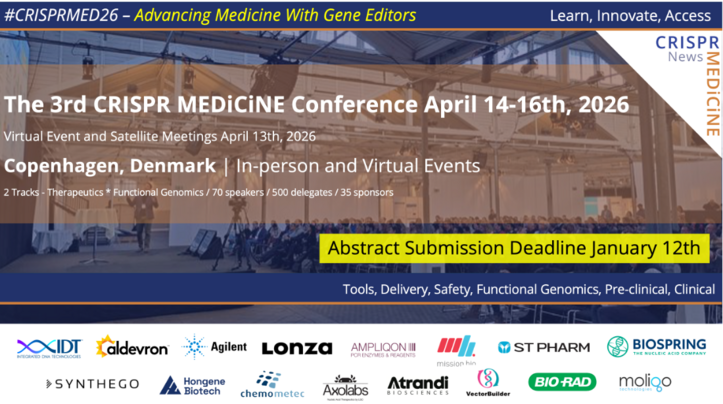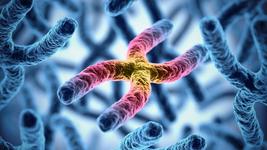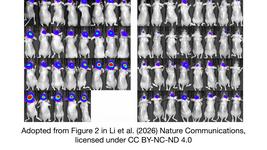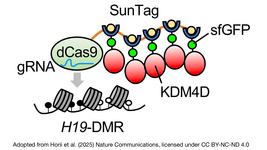CMN Weekly (26 August 2022) - Your Weekly CRISPR Medicine News
By: Gorm Palmgren - Aug. 26, 2022
CMN Intelligence - The World’s Most Comprehensive Intelligence Platform for CRISPR-Genomic Medicine and Gene-Editing Clinical Development
Providing market intelligence, data infrastructure, analytics, and reporting services for the global gene-editing sector. Read more...
Top picks
- A paper in Molecular Cell describes the structure and engineering of the minimal type VI CRISPR-Cas13bt3 (also known as Cas13X.1). The structure revealed how Cas13bt3 recognises the guide RNA and its target RNA and provided insights into the nuclease's distinct activation mechanism. Furthermore, the authors rationally engineered enhanced Cas13bt3 variants and ultracompact RNA base editors.
- Researchers in California have demonstrated a method for high-yield genome engineering in primary cells using a hybrid ssDNA repair template and small-molecule cocktails. Knock-in efficiency and yield are boosted two- to threefold by using ssDNA with Cas9 target sequences in HDR templates instead of dsDNA. The small-molecule combinations enhance HDR and increase knock-in efficiencies by an additional two- to threefold.
Research
- A novel type V Cas12a endonuclease from Ruminococcus bromii (RbCas12a) can cleave target DNA templates efficiently, using the exceptionally high accessibility of PAM 5′-YYN and has a relatively wide temperature range from 20 °C to 42 °C. Furthermore, the Russian authors show that the human-optimised RbCas12a nuclease is also active in mammalian cells and can be applied for efficient deletion incorporation into the human genome.
- A team of researchers from Taiwan and elsewhere have used the CRISPR-dCas9 system to construct an in vitro disease model for the aggregation of α-synuclein (SNCA) - characteristic of Parkinson's disease and Lewy body dementia - in HEK293T cells. Activating SNCA by dCas9 was robust and did not interfere significantly with cell viability.
Industry
- Century Therapeutics has received Investigational New Drug (IND) clearance from FDA for CNTY-101 to treat relapsed or refractory CD19 positive B-cell malignancies. CNTY-101 is an allogeneic cell therapy product candidate with six genetic modifications incorporated using sequential rounds of CRISPR.
- Seelos Therapeutics has received an undisclosed amount in a grant from The Michael J. Fox Foundation to further its research in SLS-004 for treating Parkinson's disease. SLS-004 is a novel epigenome-editing approach to modulating the expression of the SNCA gene mediated by modification of DNA methylation using CRISPR-dCas9. In a rodent model, a single in vivo dose of SLS-004 has achieved a therapeutically desirable 27% reduction in SNCA mRNA and a 40% reduction in the expression of SNCA protein.
- Verve Therapeutics will present preclinical data on its base editing therapeutic candidate VERVE-201 at the European Society of Cardiology 2022 Congress on Monday. VERVE-201 is designed to permanently turn off the ANGPTL3 gene in the liver, a key regulator of cholesterol and triglyceride metabolism, with a precise A-to-G base pair DNA change.
- Arbor Biotechnologies and Acuitas Therapeutics have agreed to combine the optimised delivery of Acuitas' highly validated LNP technology with Arbor’s differentiated, proprietary CRISPR gene editing technology designed for use in vivo in patients with rare liver diseases.
Detection
- A new ultrasensitive, rapid, and highly specific method can detect microRNAs using primer exchange reaction (PER) and CRISPR-Cas12a. The fluorescent biosensor for miRNA detection was characterised by low detection cost, simple operation, and mobility, providing a promising platform for the point-of-care testing of miRNA-21.
- Point-of-care testing of Salmonella in foods is enabled with a new CRISPR Cas12a-based "sweet" biosensor coupled with a personal glucose meter readout. The indirect signal transformation from the original target gene invA to the final glucose signal was achieved through recombinase-aided amplification (RAA), CRISPR Cas12a reaction, enzymic reaction, and glucose signal reading. As a result, quantitative detection of Salmonella in spiked milk samples was achieved within the range from 1 to 1×103 CFU/reaction.
- Researchers in China describe a multiplexed lateral flow assay integrated with an orthogonal CRISPR-Cas system for SARS-CoV-2 detection. The lateral flow assay achieved a detection sensitivity of 10 copies per test from nasopharyngeal swab clinical samples within 1 hour.
Reviews
- A new review seeks to establish genome editing as a promising therapeutic approach for treating and preventing atherosclerotic cardiovascular disease. The American authors present proof-of-concept studies that have elucidated the superior therapeutic potential of genome-editing strategies for treating hyperlipidemia, thus substantiating their progression to clinical studies.
- A review by Indian researchers examines recent advances and therapeutic strategies using CRISPR genome editing for cancer treatment. Associated challenges, safety concerns, and the various methods that can be implemented to overcome these drawbacks are also discussed.
To get more of the CRISPR Medicine News delivered to your inbox, sign up to the free weekly CMN Newsletter here.
Tags
CLINICAL TRIALS
IND Enabling
Phase I
Phase II
Phase III
Gastric Cancer and Colorectal Cancer, CRC, (NCT07166263)
Sponsors:
Base Therapeutics (Shanghai) Co., Ltd.
Sponsors:
Base Therapeutics (Shanghai) Co., Ltd.
IND Enabling
Phase I
Phase II
Phase III
Relapsed or Refractory Acute Myeloid Leukemia, AML, (NCT06541444)
Sponsors:
Base Therapeutics (Shanghai) Co., Ltd.
Sponsors:
Base Therapeutics (Shanghai) Co., Ltd.
IND Enabling
Phase I
Phase II
Phase III







